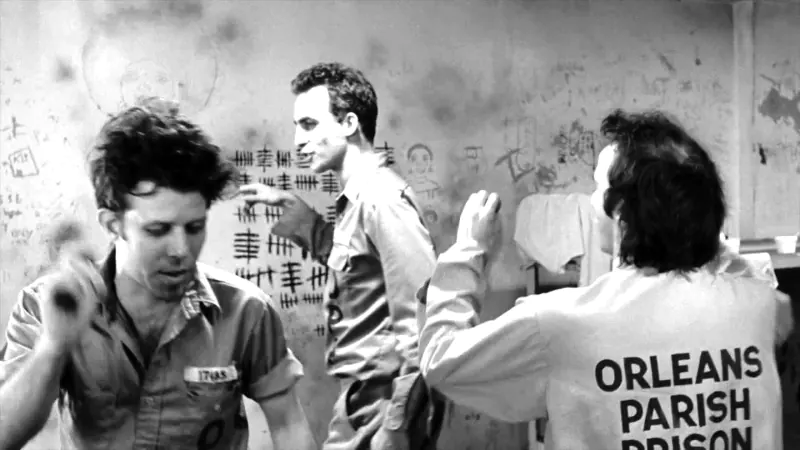Jim Jarmusch's Arthouse Prison Break Movie
There was a time when people went into the cinema with an open mind. They would allow filmmakers to seduce them into strange worlds where things don't happen according to dry logic. There was no need for superheroes, violence or visual porn (sex was okay, though). Stories could be raw and direct, the style was often brave and peculiar. It was a universe of wonder. In those days, Jim Jarmusch was hailed as a hero and Down By Law become one of his proudest children.
TALENT POWERHOUSE
Jarmusch established his trademark cinema around the mid 80s as a counterpoint to the loud Hollywood emotions, with slow-building stories in stark black and white, but colored by powerful, über-cool soundtracks. Looking back, the constellation of talent in this movie is astonishing. In only his third feature , Jarmusch assembled John Lurie, Tom Waits, Ellen Barkin and indie camera wiz Robby Müller. In the middle of this potent mix, he threw Roberto Benigni, the man who 20 years later would write, direct and star in what would for a long time remain the highest grossing foreign language movie of all time: Life Is Beautiful.
STYLE
Perhaps style supersedes story with Jarmusch. Many of the scenes, even some of those out in the Louisana swamps, feel theatrical, and surely not the type of fast-moving, plot-heavy Mametian kind but rather more absurdist in the style of Beckett’s Waiting For Godot. The theatricality is offset by Müller’s gorgeous b/w imagery and the occasional strip of fine music. Lovers of jazz and fans of Tom Waits or The Lounge Lizards will find a rare treat in John Lurie’s sparse, cool soundtrack.
STORY
Summarized, Down by Law sounds like a prison break movie, yet it is much less and at the same time a lot more. The story is minimalist, about three men who - after the unlikeliest of events - end up together in a small prison cell. Rather than plotting their escape, they spend most of their time arguing. Not surprisingly, Benigni offers the lighter touch. Although the film is very much dialogue driven, we only learn about the men’s crimes at the mid point; and our scene follows immediately after.
ICE-CREAM

The problem with many art house films is that they take themselves too seriously. Jarmusch’ films have never had this problem and my favorite scene in Down By Law is the best example of this. Like Benigni, my English was not the best back in 1986 and I shared Bob’s innocent wonder about the loopiness of the English phrase “I scream, you scream, we all scream for icecream”. Much like the movie, the scene builds slowly, gets more energy along the way, only to suddenly die out. But what I find most intriguing after all these years, is how the role of Benigni’s character in this small indie arthouse film is strikingly similar to the one that earned him all the Oscars and worldwide glamor twenty years later. His child-like innocence brings a spark of hope in what seems like a dead-end situation for those around him.
Karel Segers
Karel Segers wrote his first produced screenplay at age 17. Today he is a story analyst, script editor and producer with experience in rights acquisition, script development and production. His
screenwriting classes have trained writers in Australia, Europe, Asia and the Middle East, and his clients include international award-winning filmmakers as well as three Academy Award nominees.
Karel is the founder of
The Story Department and he ranks in the world's Top 10 of most influential people for screenwriting on Twitter.